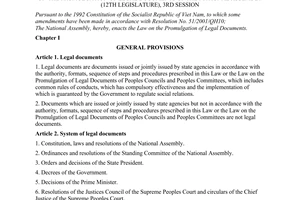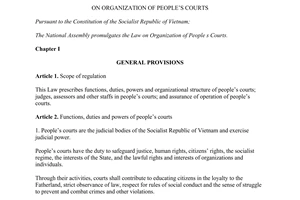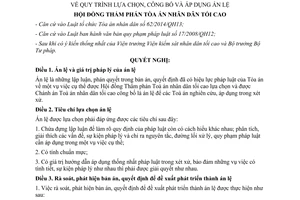Resolution No. 03/2015/NQ-HDTP on process for selecting publishing adopting precedents đã được thay thế bởi Resolution 04/2019/NQ-HDTP On process for selecting publishing and applying precedents và được áp dụng kể từ ngày 15/07/2019.
Nội dung toàn văn Resolution No. 03/2015/NQ-HDTP on process for selecting publishing adopting precedents
|
COUNCIL OF JUSTICES |
SOCIALIST REPUBLIC OF VIETNAM |
|
No. 03/2015/NQ-HDTP |
Hanoi, October 28, 2015 |
RESOLUTION
ON PROCESS FOR SELECTING, PUBLISHING AND ADOPTING PRECEDENTS
COUNCIL OF JUSTICES OF THE SUPREME PEOPLE’S COURT
- Pursuant to the Law on organization of People’s Court No. 62/2014/QH13;
- Pursuant to the Law on promulgation of legislative documents No. 17/2008/QH12;
- Upon the consensus of the Chief Procurator of the Supreme People’s Procuracy and the Minister of Justice.
RESOLVES:
Article 1. Precedents and legal status of precedents
Precedents are arguments and rulings written on effective judgments or decisions (hereinafter referred to as judgment) of the courts that are selected by the Council of Justices of the Supreme People's Court and published by the Chief Justice of the Supreme People’s Court in order for other courts to study and adopt them when deciding later cases.
Article 2. Criteria for selecting precedents
Each precedent to be selected must satisfy all criteria below:
1. Containing arguments to clarify the provisions of the law which have differing interpretations, analyze and explain legal issues or events, and legal principles and guidelines to be followed in a specific situation;
2. Having normative value;
3. Ensuring the consistency of law in adjudication and the same settlement results from the two cases having the same facts or events.
Article 3. Checking and selecting judgments proposed to serve as precedents
1. The judgments proposed to serve as precedents (hereinafter referred to as proposed judgments) shall be checked and selected as follows:
a) The Chief Justice of People’s Court of each central-affiliated city or province (hereinafter referred to as province), each Chief Justice of Military Court of military zones and equivalent levels (hereinafter referred to as military zones) shall summary adjudication in practice to propose the issues that need to be guided. They shall, according to the criteria prescribed in Article 2 of this Resolution, check and select their own suitable effective judgments and request Committee of Justices of People’s Court of provinces or Committee of Justices of Military Court of military zones and equivalent levels for consideration.
If a considered judgment satisfies all criteria prescribed in Article 2 of this Resolution, the Chief Justice of People’s Court of the province or the Chief Justice of Military Court of the military zone shall a report to the Supreme People’s Court (via the Department of Legislation and Science management). The report shall contain evaluation of adjudication in practice and related provisions for precedent selection proposal; the judgment containing the selected justifications or ruling to be served as a precedent (hereinafter referred to as proposed justifications or ruling); the proposal for selected judgment; and evaluation of the Committee of Justices of People’s Court of the province or the Committee of Justices of Military Court of the military region (enclosed proposed judgment/decision);
b) The Chief Justice of People’s Court of each central-affiliated city or province (hereinafter referred to as province), each Chief Justice of the Military Court of military zones and equivalent levels shall summary trial practice to propose the issues that need to be guided. They shall, according to the criteria prescribed in Article 2 of this Resolution, check and select their own suitable effective judgments and request Committee of Justices of People’s Court of provinces or Committee of Justices of Military Court of military zones and equivalent levels for consideration.
If a considered judgment satisfies all criteria prescribed in Article 2 of this Resolution, the Chief Justice of Superior People’s Court or the Chief Justice of Central Military Court shall send a report to the Supreme People’s Court (via the Department of Legislation and Science management). The report shall contain evaluation of adjudication in practice and related provisions for precedent selection proposal; the judgment containing the proposed justifications or ruling; the proposal for selected judgment; and evaluation of the Council of Justices of Supreme People’s Court or the Council of Justices of Central Military Court (enclosed proposed judgment/decision);
c) Directors of Departments of Cassation and inspection of the Supreme People’s Court shall, according to the criteria prescribed in Article 2 of this Resolution, check and select suitable effective cassation decisions of Council Of Justices of the Supreme People’s Court and judgments of other courts and send report to the Department of Legislation and Science management of the Supreme People’s Court. The report shall contain evaluation of adjudication in practice and related provisions for precedent selection proposal; the judgments containing the proposed justifications or ruling; the proposal for selected judgment (enclosed proposed judgment/decision);
d) Every individual, agency and organization may send proposal for suitable effective proposed judgments that satisfy all criteria prescribed in Article 2 of this Resolution to the Supreme People’s Court (through the Department of Legislation and Science management).
2. The checking and selecting of proposed judgments shall be carried out biannually by the courts.
Article 4. Consultation about proposed judgments
1. Upon the receipt of reports and proposed judgments prescribed in Clause 1 Article 3 of this Resolution, the Department of Legislation and Science management of the Supreme People’s Court (hereinafter referred to as the Department of Legislation and Science management) shall post those judgments on the Magazine of People’s Court, the website of the Supreme People’s Court for consultation with agencies, organizations, and individuals within 2 months. A seminar on consultation with National Assembly deputies, specialists, scientists, activists and relevant agencies and organizations.
2. Within 1 month from the deadline for consultation prescribed in Clause 1 of this Article, the Department of Legislation and Science management shall take charge and cooperate with competent units of the Supreme People’s Court in collection of opinions; study and assess the contents of proposed judgments, opinions of agencies, organizations, and individuals, and then send them to the Chief Justice of the Supreme People’s Court. The Chief Justice of the Supreme People’s Court shall consider collecting opinions from Precedent advisory board.
Article 5. Precedent advisory board
1. The Precedent advisory board shall be established by the Chief Justice of the Supreme People’s Court at the request of the Department of Legislation and Science management and include at least 9 members. The Board President is the President of Science Council of the Supreme People’s Court, 1 Board Deputy President is the Deputy President of Science Council of the Supreme People’s Court, 1 Board Secretary is the leader representative of the Department of Legislation and Science management and members are representatives of the Ministry of Justice, the Supreme People’s Procuracy, the Vietnam Bar Federation and leading legal specialists and scientists and representatives of relevant agencies and organizations.
With regard to a criminal precedent, the composition of the Precedent advisory board shall include the Ministry of Public Security.
2. The Precedent advisory board must discuss and offer opinions for the contents of proposed judgments.
3. After the Precedent advisory board is established, the Department of Legislation and Science management shall documents on request for precedent advisory to the members of Precedent advisory board.
The documents on request for precedent advisory shall include: a written request for precedent advisory issued by the Supreme People’s Court; a report on results of study and assessment of proposed judgments issued by the Department of Legislation and Science management; a final report of opinions on the proposed judgments; and the proposed judgments.
4. Within 15 days, from the date on which the documents on request for precedent advisory are received, the Board President shall preside over a meeting to discuss about the proposed judgments and send a report on results of the meeting (enclosed the documents on request for precedent advisory) to Chief Justice of the Supreme People’s Court.
Article 6. Ratification of precedents
1. According to the report sent by the Precedent advisory board, the Chief Justice of the Supreme People’s Court shall hold a meeting of all Council of Justices of the Supreme People’s Court to discuss and vote on ratification of the precedents.
2. A meeting of the Council of Justices of the Supreme People’s Court is considered valid when it is attended by at least 2/3 of member of the Council of Justices; a decision of the Council of Justices of the Supreme People’s Court is ratified when it is voted for by more than half of the participating members.
3. The voting result of precedent ratification shall be recorded in the meeting minutes of the Council of Justices and served as the basis for the Chief Justice of the Supreme People’s Court to publish precedents.
Article 7. Publication of precedents
1. When a precedent is ratified by the Council of Justices of the Supreme People’s Court, the Chief Justice of the Supreme People’s Court shall publish the precedent.
2. Each precedent to be published shall contain:
a) The name of the case settled by the court;
b) Number of judgments of the court having precedential value;
c) Catchwords of resolved legal opinions in the precedent;
d) A recital of the facts in the case and ruling of the court related to the precedent;
dd) The legal opinions served as the guidelines for adjudication in the precedent.
3. The precedent shall be published in the Magazine of People’s Court and the website of the Supreme People’s Court, sent to the courts and published in the law reports annually.
Article 8. Rules for adopting precedents in adjudication
1. Each precedent shall be studied and adopted in adjudication after 45 days from the date on which it is published or written in the decision on precedent publication issued by the Chief Justice of the Supreme People’s Court.
2. The judges and the jurors must study and adopt the precedent to settle similar cases so that the two cases had similar facts to one another shall have the same settlement results. If a precedent is used, all judgments of courts having precedential value, all similar facts specified in the precedent and all similar facts in the case to be solved and the legal opinion mentioned in the precedent must be cited, analyzed and specified in the judgment or the decision of the court; if the precedent is not adopted, they must provide explanation in the judgment.
3. In case a precedent is no longer suitable due to the changes in any Law or Resolution of the National Assembly, Resolution of Standing Committee of the National Assembly or Decree of the Government, the judges and the jurors shall not adopt that precedent.
4. In case a precedent is no longer suitable due to other changes, the judges and the jurors shall not adopt that precedent and immediately request the Council of Justices of the Supreme People’s Court (via the Department of Legislation and Science management) to consider annulling the precedent as prescribed in Clauses 2, 3, 4 and 5 Article 9 of this Resolution.
Article 9. Annulment and replacement of precedents
1. In case a precedent is no longer suitable due to the changes in any Law or Resolution of the National Assembly, Resolution of Standing Committee of the National Assembly or Decree of the Government, that precedent shall be obviously annulled.
2. In case a precedent is no longer suitable due to other changes but there is no provision regulating those issues, the Council of Justices of the Supreme People’s Court shall consider annulling that precedent.
The persons competent to check and select proposed judgments prescribed in Clause 1 Article 3 of this Decree may request the Council of Justices of the Supreme People’s Court (through the Department of Legislation and Science management) to consider annulling or replacing precedents.
3. If a jury panel does not adopt a precedent and provide explanation in the judgment/decision, it shall send a written request for replacement of the precedent to the Supreme People’s Court (through the Department of Legislation and Science management) and attach that judgment/decision after pronouncing the judgment.
4. Upon the receipt of the request for annulment or replacement of precedent prescribed in Clause 2 and Clause 3 of this Article, the Department of Legislation and Science management shall study and send a report to the Chief Justice of the Supreme People’s Court. The Chief Justice shall hold a meeting with the participation of all Council of Justices of the Supreme People’s Court to consider canceling or replacing the precedent.
5. The Council of Justices of the Supreme People’s Court shall hold a meeting to vote for the annulment or replacement of the precedent prescribed in Clause 2 and Clause 3 of this Article according to the rules prescribed in Clause 2 Article 6 of this Resolution.
According to the voting result in the meeting, the Chief Justice of the Supreme People’s Court shall announce the annulment or replacement of the precedent, which clarify the effective date.
The decision on annulment or replacement of the precedent shall be published in the Magazine of People’s Court and the website of the Supreme People’s Court and sent to the courts.
Article 10. Effect
1. This Resolution is ratified on October 19, 2015 by the Council of Justices of the Supreme People’s Court and comes into force from December 16, 2015.
2. Difficulties that arise during the implementation of this Circular should be reported to the Supreme People’s Court for consideration.
|
|
ON BEHALF OF THE COUNCIL OF
JUSTICES |
------------------------------------------------------------------------------------------------------
This translation is made by LawSoft and
for reference purposes only. Its copyright is owned by LawSoft
and protected under Clause 2, Article 14 of the Law on Intellectual Property.Your comments are always welcomed


